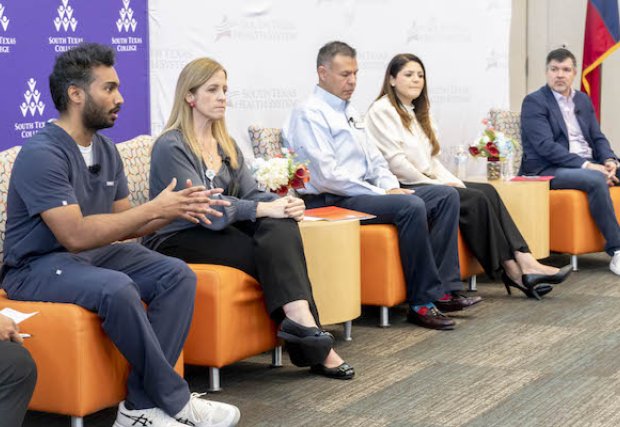South Texas Health System and Prominence Health Plan Host Diabetes Panel Discussion

Diabetes is the seventh leading cause of death in the U.S. and affects more than 10% of the population, according to the CDC. Cases continue trending upward, with obesity, lack of physical activity and unhealthy eating patterns among the greatest risk factors.
Large scale, immediate action is required to combat the epidemic of diabetes across the nation, especially in the Rio Grande Valley — where socioeconomic and race demographics place the population at greater risk for prediabetes and type 2 diabetes. South Texas Health System and Prominence Health Plan are joining forces to rally the community to prevent, treat and beat diabetes in the four-county region.
On Wednesday, March 23, STHS held a diabetes panel discussion in collaboration with Prominence Health Plan and South Texas College as the lead-up event to the inaugural Prevent, Beat and Treat Diabetes Symposium. Moderated by South Texas Health System’s Tom Castaneda, the panel featured local healthcare experts and community leaders who discussed what needs to be done as a community to help improve the health and wellness of the people of the Valley by reducing the incidence of diabetes in the region.
Diabetes Management Services
Learn more about diabetes services at South Texas Health System McAllen →
Panelists included STHS Clinics’ Dr. Sujan Gogu, a triple board-certified physician in family medicine, sports medicine and pain medicine; Hidalgo County Pct. 2 Commissioner Eduardo “Eddie” Cantu; PSJA I.S.D. Health Services Director Sulema Solis, who is a licensed family nurse practitioner; Collective Impact Director of Unidos Contra la Diabetes Moises Arjona; and licensed dietician-nutritionist Ana D’Escrivan, who runs Complete Nutrition Solutions.
“COVID really exacerbated diabetes by preventing people from visiting their primary care doctor or losing their insurance from unemployment,” Dr. Gogu said. “When you lose that, your thought process isn’t ‘I need to see a doctor,’ your thought process is completely different."
“As a physician, education is at the forefront of what I do, and in treating patients I make sure to get an understanding of their education level for these chronic illnesses our community faces. Moving forward we need to find ways to prioritize education and prevention above all to reverse these rapidly increasing rates of diagnosis.”
Topics of the discussion centered around the five “C” pillars of health equity: cure, care, cost, cuisine and connect. The conversation continued on Saturday, March 26 during the full-day symposium open to the entire community, which featured educational sessions specially tailored for seniors, adults, children and caregivers led by physicians, dieticians, counselors and exercise therapists.
